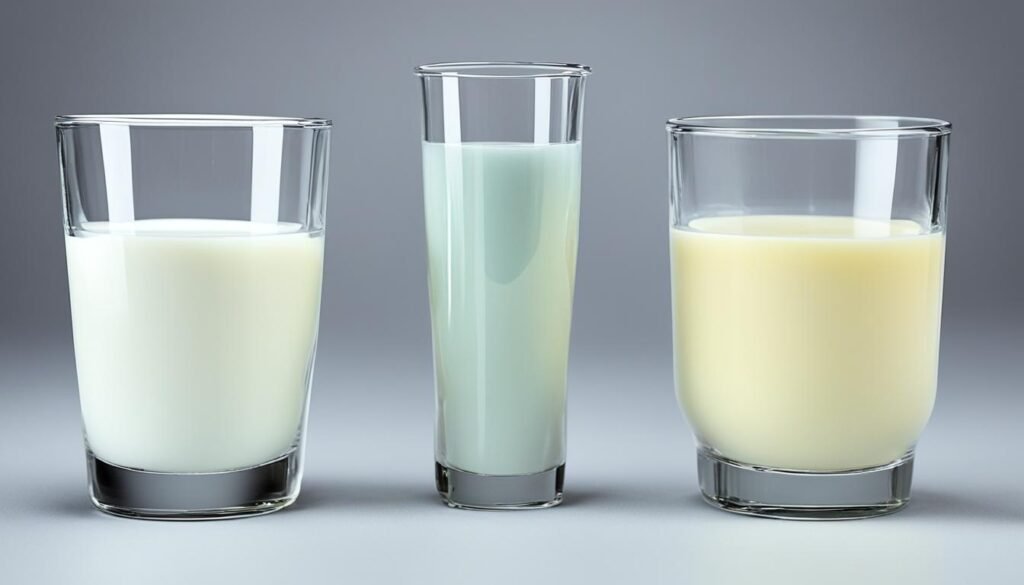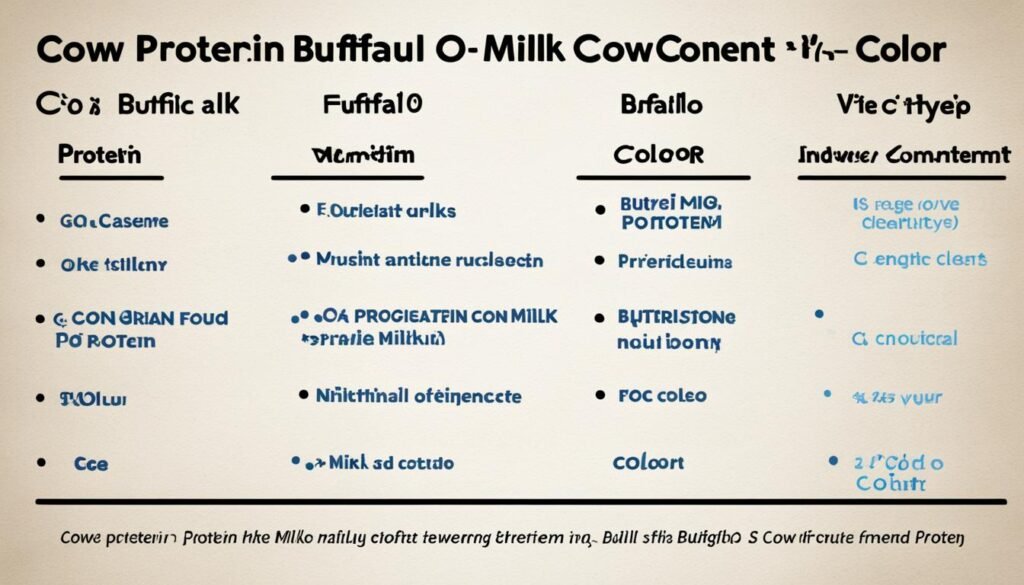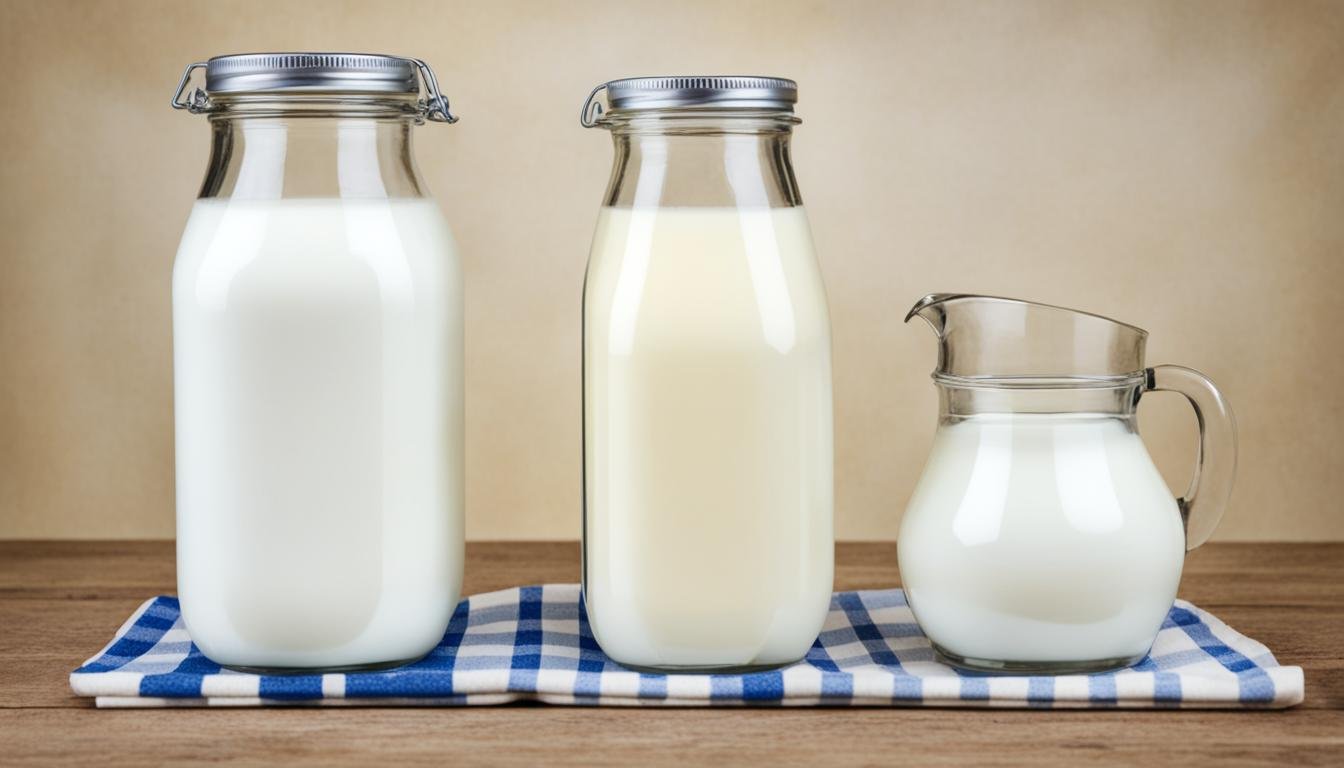Did you know buffalo milk has 237 calories in a cup, but cow milk only has 148? This large gap in calories is a big deal when deciding between them. Each milk type is full of nutrition and has its own health benefits and uses.
In places like Pakistan, choosing between cow and buffalo milk is about what you like, need in your diet, and what’s around. We’ll look at the main differences in these milks. We’ll talk about their fat, protein, how easily you digest them, and what that all means for your health.
Key Takeaways
- Cow milk contains 3-4% fat, while buffalo milk has a higher fat content of around 7-8%.
- Buffalo milk is higher in protein, containing 10-11% more than cow milk.
- Cow milk is generally easier to digest due to its smaller fat globules.
- Buffalo milk has a higher cholesterol content compared to cow milk.
- Cow milk is lower in calories and may be a better choice for those watching their weight.
Choosing between cow and buffalo milk isn’t simple. Each milk has its own good points for your health and diet. By looking at the key differences, you can pick the milk that’s right for you. This choice can help you have a healthier, more balanced diet.
Introduction
Milk packs a big nutritional punch with calcium, protein, vitamins, and minerals. Thinking about cow and buffalo milk? They both offer special nutrients and benefits. Knowing the contrast helps you pick the right one for you.
Milk’s Nutritional Value
Milk is full of vitamins and minerals. No matter if it’s cow or buffalo milk, both give you calcium, protein, and other vital nutrients. Learning about each milk type’s nutrients makes a smart choice easy.
Choosing Between Cow and Buffalo Milk
Deciding between cow and buffalo milk requires thought. Each type has special nutrients and health perks. Things like fat content, protein levels, digestibility, and calories matter in making the right choice.
Fat Content Comparison
The main difference between cow milk and buffalo milk is their fat content. Cow milk has less fat, about 3-4%, while buffalo milk has more, around 7-8%. This makes buffalo milk creamier. Yet, for those watching their fat or health, cow milk might be better.
Cow Milk’s Lower Fat Content
Cow milk has roughly 3-4% fat, which is lower. This can be great for people wanting to cut back on their fat intake. It’s also a good choice for those with heart or weight concerns. Plus, cow milk is often easier to digest than buffalo milk.
Buffalo Milk’s Higher Fat Content
Buffalo milk has more fat, about 7-8%, giving it a smooth, creamy feel. Though some love this richness, it might not be ideal for everyone. Those on strict diets or watching their fat intake might choose other options.

Protein and Nutritional Composition
Buffalo milk has more protein than cow milk. It is heat-resistant, which makes it good for cooking. This is helpful for people who want to eat more protein.
Cow milk offers a balanced mix of nutrients. It is rich in protein, carbs, and vitamins. Cow milk is great for everyone because it has many essential nutrients like calcium and vitamins A and B12.
So, picking buffalo or cow milk depends on what you need. They both have special nutritional value. Think about what you like, how you cook, and your health aims to choose the best for you.

Digestibility and Lactose Intolerance
Cow milk is easier to digest than buffalo milk. This is because cow milk has smaller fat globules, making it easier to break down. For people with lactose intolerance or other tummy troubles, buffalo milk might not be the best choice.
Cow Milk’s Easier Digestibility
Cow milk has less fat and a different protein makeup. As a result, many find it easier to digest. If you have a sensitive stomach, choosing cow milk could be a good idea. It’s often easier on the stomach than buffalo milk.
Buffalo Milk and Digestive Issues
Buffalo milk has a higher fat content and larger fat globules. This makes it harder to digest than cow milk, especially for people with lactose intolerance. Its thicker texture might cause stomach problems too. If your stomach is easily upset, going for cow milk might be better.

Cow or buffalo milk is better
The choice between cow milk and buffalo milk hinges on what is best for you. This decision depends on your likes, health needs, and what your body can easily digest. Both have good things about them, like different levels of fat, protein, and how easy they are on your stomach.
Talk to a healthcare pro to figure out what milk suits your diet and health goals. They can give you advice that matches your needs.
Buffalo milk packs in more protein, calcium, and phosphorus. This is great for keeping your bones and teeth strong. But, cow milk is lower in calories and fat. This might be better if you’re on a diet or worry about high cholesterol.
Your choice of milk, cow or buffalo, is really about what you need for your health and diet. Personal health choices are key.
“Consulting with a healthcare professional can help you determine the most suitable milk choice based on your specific requirements and goals.”
Maybe you love the creamy taste of buffalo milk. Or, perhaps you go for cow milk because it’s more common and easy to find. Both can fit well in a diet that’s good for you. Knowing what each type offers helps you make a smart choice for your well-being.
Cholesterol and Heart Health
When talking about milk and your heart, cholesterol matters a lot. Buffalo milk has more cholesterol than cow milk. This is key for those watching their cholesterol or are at heart disease risk. Cow milk, being lower in cholesterol, is a better pick for heart health.
Cow Milk’s Lower Cholesterol Content
Cow milk has less cholesterol than buffalo milk. Research shows cow milk has about 3.14 mg/g of cholesterol. But, buffalo milk only has 0.65 mg/g. With cow milk’s lower cholesterol, it’s a better choice for a healthier heart.
Vitamin and Mineral Content
Milk vitamin and mineral content in cow milk and buffalo milk differ. Cow milk is rich in vitamin A and vitamin B12, key for eyes, bones, and immune system. In contrast, buffalo milk is packed with calcium and phosphorus for strong teeth and bones.
Calcium content in buffalo milk stands out. It gives 32% of the daily value (DV) in one cup. Cow milk, on the other hand, only has 21% DV. This means buffalo milk is great for bone health, aiming to prevent osteoporosis.
Buffalo milk boasts more antioxidants and vitamin A than cow milk. Thanks to better beta-carotene conversion, buffalo milk is whiter and packs more health benefits.
Deciding between cow milk and buffalo milk depends on what you need. Talking to a healthcare expert can guide you. They’ll help choose the milk type best for your health.
Calorie Content and Weight Management
The calorie content of cow milk and buffalo milk is not the same. Cow milk has around 148 calories in a cup. In comparison, buffalo milk has about 237 calories in that same amount. This difference matters a lot for people who watch their calorie intake or are into managing their weight.
If your aim is to stay fit or watch how many calories you eat, go for cow milk. It’s lower in calories. Choosing buffalo milk might not be the best for those focusing on weight management. This is because it has more calories.
Conclusion
Cow and buffalo milk both have their unique benefits. Choosing one depends on what you need for health and diet. Think about fat, protein, digestion, cholesterol, and vitamins. These things help figure out which milk is best for you.
Cow milk is seen as healthier because it’s lower in calories and has a good mix of nutrients. Yet, buffalo milk shines with certain vitamins, minerals, and antioxidants. This makes it great for skin, vision, and heart health. Plus, it has more protein, which is good for people who work out.
It’s wise to talk to a healthcare expert to decide on the best milk for you. Your choice might be based on liking buffalo milk’s creamy taste or needing cow milk’s easier digestion. Think about what you value in milk to pick what’s right for your health and wellness.
